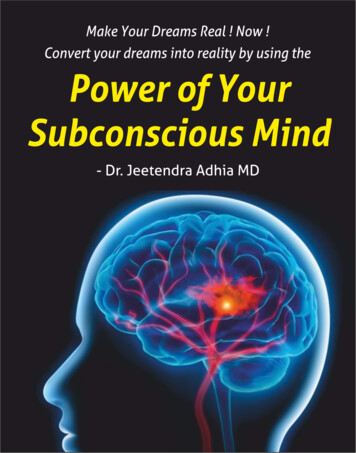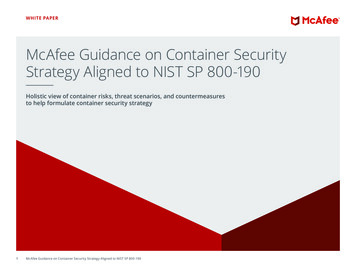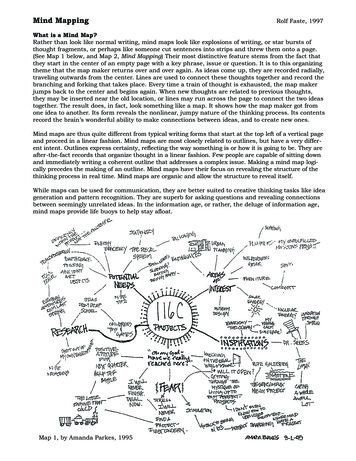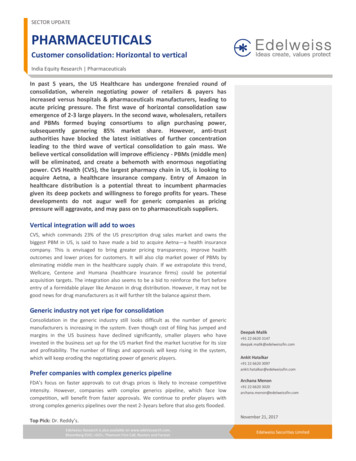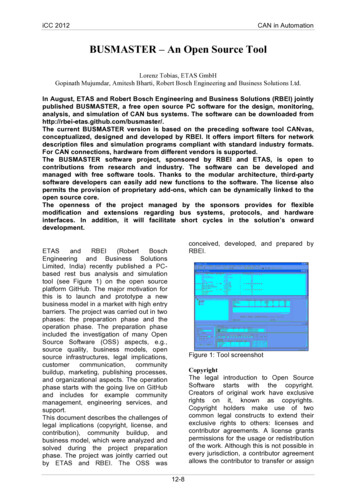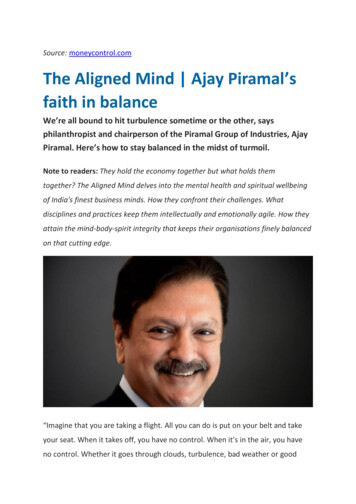
Transcription
Source: moneycontrol.comThe Aligned Mind Ajay Piramal’sfaith in balanceWe’re all bound to hit turbulence sometime or the other, saysphilanthropist and chairperson of the Piramal Group of Industries, AjayPiramal. Here’s how to stay balanced in the midst of turmoil.Note to readers: They hold the economy together but what holds themtogether? The Aligned Mind delves into the mental health and spiritual wellbeingof India's finest business minds. How they confront their challenges. Whatdisciplines and practices keep them intellectually and emotionally agile. How theyattain the mind-body-spirit integrity that keeps their organisations finely balancedon that cutting edge.“Imagine that you are taking a flight. All you can do is put on your belt and takeyour seat. When it takes off, you have no control. When it’s in the air, you haveno control. Whether it goes through clouds, turbulence, bad weather or good
weather, you have no control. Some people who sit through the turbulence pray,some take the journey in fear, others enjoy a meal. That’s the only thing you havein your control; how you take the journey.” We are all on that journey some timeor the other, says philanthropist and business leader, chairperson of the PiramalGroup of Industries, Ajay Piramal. The only difference between is how we react inthe face of it. This is the essential lesson of philosophy and how we internalisethat philosophy is what determines our elation or mental burden.When we compare ourselves with others, we imagine that some people areinured to the vicissitudes of life while we are left to struggle. However, no one isfree of suffering. Not even Piramal, who has faced his own share of setbacks andchallenges.He was a 24-year-old visiting New York with his father, Gopikisan Piramal, whenthe latter suffered a heart attack and passed away within 30 seconds. “That justshows we can build everything in life but it just takes 30 seconds for it all to befinished. I am talking to you now but I don’t know I may not be here 30 secondslater. We have to realise that. I may be the world’s most powerful man, but I cango in moments.” The trauma of coping with his father’s sudden passing wascompounded by a period of strife. The group was facing a textile strike when hisbrother, then the chairperson, was afflicted with cancer, which had fewtreatment options at that time. He, too, passed away within a few years.
“If you have ever lived with a cancer patient, it is a very trying time. There aresudden peaks and then suddenly things get worse. These things keep happening.His wife was 29 at the time, he had three kids, the youngest was 2 years old. I hada responsibility towards and a struggling business and that’s where we were. Nowlooking back, people say ‘overcoming that was such a big deal’, but I look backand think that time too passed. At the end of the day, you have to keep fightingand ultimately the time will change. There are so many such turbulent times. I cangive you a hundred examples,” he says.There is nobody who doesn’t go through these times Piramal reminds you. Thereis just an image that some people, whether actors, politicians or business leaders,remain disaffected. We deify public figures and strip them of their very humansuffering. When, in fact, it is by walking through such times that we all gain ourkeenest lessons.“All the greatest people have suffered so much. Even Siddhartha [Gautama, theBuddha], did not lead a simple life. Just see how many struggles they have had togo through. Lord Ram had to go through 14 years of exile, he had to be separatedfrom his wife, she was kidnapped, he had to fight, he lost his kingdom. Take anyexample and I’ll show you there are problems. Jesus Christ, can you imagine beingnailed alive to a cross? What more can be done to you? Look at Sita, kidnapped
and had to live among devils and demons. Krishna, born in a prison, separatedfrom his birth mother, at a young age facing so many attacks . Look at anybody.”This assumption that some people do not suffer is what makes us quick to praiseas well as quick to blame, and we tear down as hastily as we build up. This givesus a false notion of others’ success and failure.The only solution to navigating this, the turbulence of time as well as the blameand praise, the success and non-success, that we each do go through, isequanimity.“Life has to have to have ups and downs. There is nobody who has not had theirdowns. There will be ups also. Philosophy teaches us that you have to beequanimous. You don’t get extra elated with success you don’t get too depressed.That’s what I have tried to follow, not always, but that is the attempt. The bad willpass, COVIDF-19 will also pass, but the good will also pass. We have to recognisethat,” Piramal says. The difference between the person enjoying his meal on theturbulent flight and the man praying in fear is the knowledge that whatever willcome to pass will come and pass.The key to understanding this is also to know that anyone who seems successfultoday has also made mistakes, faced challenges and overcome obstacles.“Looking in from the outside, you think everybody has made no mistakes and isperfect. There is no such thing. That’s why when you read history, biographiesand autobiographies, you have to remember people only narrate the good parts. Ihave not known anybody who has not made big mistakes. There is nobody in theworld who has not faced difficulties. There is nobody who has not facedchallenges. You think Narendra Modi has not faced challenges? He has. You thinkBill Gates has not faced challenges? He has. First, let’s remove that notion.Everybody has made mistakes but the philosophy is what is important.”
What is the value of going through challenges with equanimity? It opens the doorto other opportunities. “Nature, the universe, the Lord whatever you choose tocall it, sees to it you get another door to open. At the time, another door openedand we went into pharmaceuticals. Ultimately, if we had been average in textiles,believe me we would have done nothing else and we would have remainedaverage. But here, we got a chance to grow more.” This time of COVID-19, withlockdown restrictions, job loss and income loss, health expenses doesn’t look likeit is a phase that has much to offer us, but he suggests we look closer. “We maynot realise, it is a tough time for everybody, we have to spot the opportunity.Opportunities are strewn on the path around us, we have to grasp ours.”The things that made a huge difference to his periods of struggle, and, he says,there have been many through the years, has been family support. “My familywas around me. My wife and mother were very supportive. My kids were not yetborn. Whoever was there was fully behind me. At such times you need thesupport. I also have to thank my parents for this faith that has been given to mebut I also think it’s the blessing of a higher power.”A story he repeats often, both to himself and others, is of the young boy in adream who is walking on a beach of his life with God. There are two sets offootprints in the good times but in the bad, only one. The boy feels abandoneduntil God reveals to him, that he carried him through the bad times. “That is thebasis of what I believe. Everything will pass,” Piramal says.You would think that it is difficult to be both a philosopher and a pragmaticbusinessperson. Merging the two doesn’t just come easy to Piramal, who haswritten the book Light Has Come to Me, on the principles of the Gita inmanagement, and composed an entire opera, The Dance of Life, he thrives on thisthe biggest merger of his life. How is it possible to combine the creative energieswith the pragmatic ones?
“Arjuna was a fighter, the best archer in the world, in the prime of his youth whowas tasked with killing his enemies. The Bhagavad Gita was spoken in thebattlefield. It wasn’t given just randomly so. It’s not that you have to go to theHimalayas to get some revelation. That’s why the Gita is taught. I’m abusinessperson today but at home I am a parent, husband, son and brother. Ihave to live as a whole. I cannot isolate. You are also another person in society. Itis one. It cannot be separate. That’s why we believe our purpose and values arenot separate from you. They are not practised only in the work environment. Ifwe practice these in the home environment as well, we will be better individuals.”It’s a principle, he says, he witnesses play out in the lives of his colleagues andemployees and their children as well.Faith is something Piramal hones on a daily basis. Even in his formidablecollection of art, prized is the collection of granite sculptures by AdwaitaGadnayak, depicting the scenes of the Gita, placed within his line of sight as heworks. He undertakes several personal mindful and spiritual practices but mostprecious to him is the process of Shravana, which is the listening to sacred texts, aform of both bhakti, devotion, and study.“We undertake many practices but we also have two swamijis who come to teachus different philosophies, give us examples, teach us scriptures including the Gitaand varied scriptural texts,” he says. A teacher also guides them throughmeditation. They also practice yoga under the Iyengar school.His son, Anand, undertook a course of Vipassana when younger. Discipline acrossmind body and spirit is important, Piramal says. Balance in food and exercisealong with mental and spiritual processes allow one to live in a balanced andholistic way.
The scriptural lessons of this balance also inform his insight into the energy andflow of money that have earned him the moniker ‘India’s Warren Buffet’. Piramalhas a knack of navigating distressed industry areas, negotiating mergers andacquisitions, and making a strategic exiting when the time is right.“I go on the basis of our scriptures. Money is not a bad thing to have. It’simportant to understand that. A lot of people in the social sector or other sectorswill say ‘no, no, no’, ‘to have money or riches is bad thing’. No, it’s not bad. Evento live well I live well, I live better than 99.99% of the people and there is noharm in that. Because what is important is: how the money is earned and howyou use that money for yourself and for society also.”He cites the purusharthas:Artha, Dharma, Kama, Moksha, Wealth, Morality,Enjoyment and Liberation. All are necessary for life and we make the mistake ofassuming these are an either/or option.“Artha is money and Kama is enjoyment. You have to engage with both, but youhave to do it in a dharmic way. Some people try to separate them. If you want toenjoy wealth, it’s great, but it may not be dharmic. Actually, all of it workstogether.” How you earn your money, the intention you set behind it and howyou distribute it is important to the integrity of wealth generation.“The dharma of money is first how do you get the money. Means is as importantas the end. I can be a smuggler, I can cheat people and make a lot of money.That’s not dharmic. How it is procured? What is the intention behind the use ofthe money? How it is good for those who become shareholders of your wealth,for yourself for society?”The quest to maintain this balance becomes the source of his philosophy for thePiramal group, “Doing well and doing good”. It’s not enough to simply do well,you have to do it in a good way. Again, it isn’t an either/or option. “Doing well and
doing good means we have to perform well. If you don’t perform well cannot dogood. CSR work or social work has to be done well. There are many people whothink just the act of doing social work is sufficient they cannot be asked tomeasure if they are doing it well. Doing well is also important. We also measurehow you are contributing” he says. Since resources for doing good are oftenlimited, we have to make the most of them and distribute them most efficientlyand most productively. Mindfulness needs to be applied to the process ofcreation and the process of wealth distribution.Of this is born the concept of trusteeship that informs his philanthropy. Amongother ventures, the Piramal foundation funds the ISKCON Annamrita mealdistribution system that launched Operation Karuna during the lockdown incollaboration with the Reliance Foundation and several others.“The Gita talks about how you are really trustees. You have been given what youhave been given, whether it is your wealth or your intelligence. The fact that youare a human being itself has been given to you. And your role is as a trusteemeans you have to make the best use of it for the benefit of all the beneficiaries.”A trustee, Piramal says, is comprised of four key concepts:“The Settler, a person who forms a trust and puts some wealth or resources inthat trust. So when you are born here, these are resources that are put by theLord, by nature, whatever you call it, into this trust.The second part of the trustee is his role. His role is to see that whatever theresources in the trust are used in the best way for the beneficiaries.The third is understanding that we are each trustees in whatever capacity we mayfunction. Each one of us is a trustee.
And fourth, who do we define as beneficiaries? These are our customers,employees, shareholders and society. So that is the role we have to play.”Above all, we need empathy and compassion by which to fulfil these roles. In thefield of mental health care, we’re only just opening up to preventative measuresas with physical health care.“Lots more needs to be done. Mental health is a relatively now recognisedconcept. When I was young, the son of one of my employees was going to be apsychiatrist and I wondered if he would have enough patients. But now, so manypeople I personally know are going through mental burdens and there is also lessstigma to openly discussing it, which is a good thing. We realise that some thingsare passed down genetically or are caused due to biochemical changes and that’snot that person’s fault. Sometimes we don’t understand it and the treatmenthelps. Our challenge is to empathise, and we need much more awareness andsensitivity. It’s a big process to open up as individuals and society in this way andit needs to be done.”Equanimity is also a great lesson for the social-media age, he points out, for thoseof us who get elated at likes and retweets and feel as though we are unworthy ifwe don’t get them. “People don’t like you, give you a thumbs down, it hits you.One has to be a little tougher in this. Philosophy and understanding is soimportant. You have to know what is important for you. Happiness will not comebecause someone said something good about me. Happiness is from within. Allthese things are external.”There are two quests that define every human being, Piramal notes—the searchfor happiness and the avoidance of pain.“Everything is these two. I cannot be happy externally only internally. All thepaths, whichever you follow, say this and lead to the same truth”
To live a life that is creative, spiritually grounded, empathetic, to not lose out onour sensitivity and awareness, to keep in mind our roles as custodians andtrustees, the benefit to our beneficiaries, whoever they may be, and to keep inmind the essential humanity and suffering of all beings, is to live in an aligned wayin body, mind and spirit.“Everything has to be balanced cannot be extreme on any one thing. In eat, sleep,everything. That is how it is. The Gita talks about balance.”It’s an especially relevant message in these times of hardship and lack.“What is we have to try our best, we have to work hard, we can’t give up. It is adifficult time. We have to do whatever is the best leave the result it will follow.We also have to recognise the results only come out of our actions today. Focuson the action, not on the result. Either we worry about the past or an imaginedfuture, just focus on what you have to do today and the result will follow. Andwhat follow will also pass. Nothing is ever so bad or so good that it won’t.”(Gayatri Jayaraman is an author and counsellor)Source: moneycontrol.comTo read more: 974031.html
us different philosophies, give us examples, teach us scriptures including the Gita and varied scriptural texts, he says. A teacher also guides them through meditation. They also practice yoga under the Iyengar school. His son, Anand, undertook a course of Vipassana when younger. Discipline across mind body and spirit is important, Piramal says.

